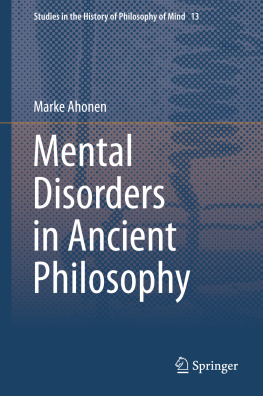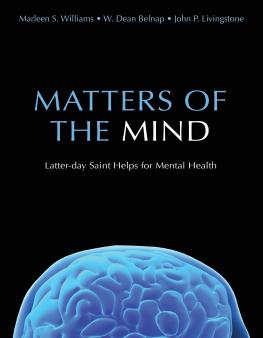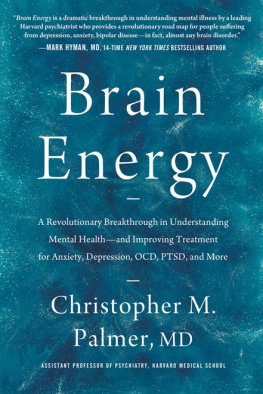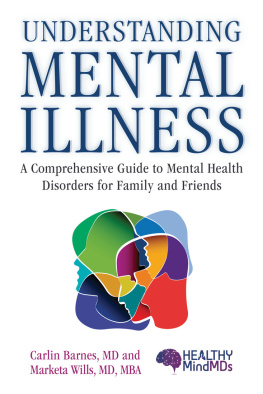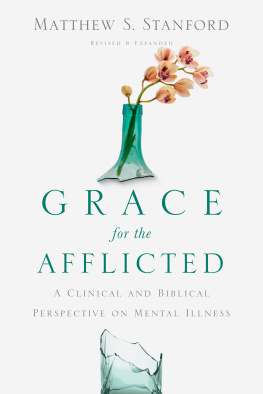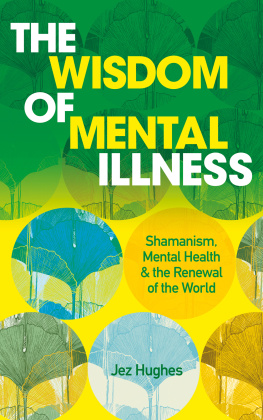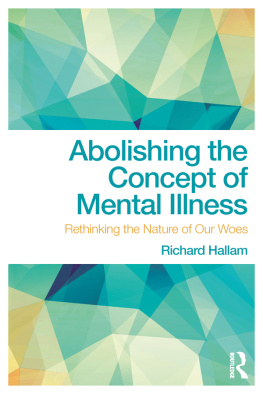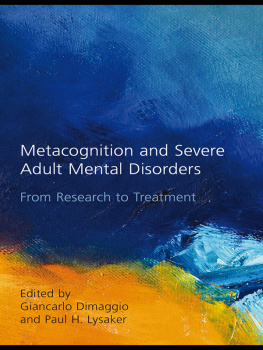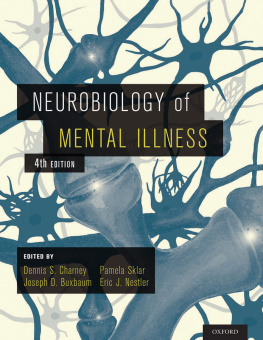1. Introduction
This is a study about ancient philosophers views on mental disorders, from Plato onwards. The task of defining mental illness and deciding what phenomena in the rich kaleidoscope of human behaviour and the inner life should be considered abnormal or pathological is a notoriously difficult and delicate one. The expression mental illness or, more correctly, mental disorder, refers today to widely varying conditions, ranging from severe psychotic disorders such as schizophrenia to more benign and less conspicuous conditions, such as mild depression, all neatly organised and described in the much-used and much-disputed Diagnostic and Statistical Manual of Mental Disorders (DSM). A whole range of so-called personality disorders is also included in the modern classification of mental disorders. A lay person browsing through a copy of DSM may find many of the diagnostic criteria laid down for mental disorders in the book somewhat general and vague, and is likely to question whether all the conditions described in the manual should be considered pathological at all. Is not some amount of depression, for example, a normal part of the expected life of a human being? Are we unnecessarily medicalising normal life phenomena, or even reducing morality to psychiatry? What is one to make of the claim that certain patterns of thought, emotional response and behaviour amount to medical illnesses, constituting something like dependent personality disorder, for example? Is not all this social conformism rather than medical science? Questions like this are made all the more poignant by the current ready availability of potent psychiatric drugs to treat these supposed disorders, even in children and young people, with still developing brains and nervous systems. On the other hand, another lay person browsing through the manual may find the experience a comforting and soothing one: finally, we are coming to terms with the fact that many unpleasant experiences and occurrences of life traditionally regarded as indicating a moral failure or even supernatural agency actually have a solid basis in the physical fragility of human nature and can consequently be addressed and relieved scientifically. Some day, perhaps, new psychiatric drugs or new kinds of psychotherapy will effectively take care of problems such as criminal behaviour (by addressing the underlying medical conditions such as personality disorders) or addictions.
The ancient discussion of mental disorders was naturally rather different from the modern one, even though the tradition of Western psychiatric thought is a continuous one, extending from the times of Hippocrates all the way through to the modern day. There is no equivalent to the modern term mental disorder in either Greek or Latin. The ancient medical authors did discuss a great many conditions that we would today label mental disorders, but it appears, as I will show, that they seldom saw such a crucial distinction between, say, melancholy and diabetes Most ancient doctors, it seems, were committed to the view that all medical disorders were of bodily origin and treatable by physical measures, and that disorders with prominent mental symptoms (e.g., melancholy) were no exception to the rule. There are some rare instances, both in medical and non-medical texts, of certain medical illnesses being referred to as diseases of the soul, in contrast to diseases of the body. Most often, however, the phrase disease of the soul was reserved for philosophical use, the philosophers using it to refer to non-medical mental problems and moral flaws they conceived of as being analogous to bodily diseases in their being unnatural and against the right order of things. These, too, could ultimately be attributed to a bodily origin, but it was usually the philosopher and not the physician who had the expertise to diagnose and treat them. All this will be fully discussed in the subsequent chapters.
In this study, I do not use the recurring term mental illness as the equivalent of mental disorder in modern psychiatry. of this study, along with the Greek and Latin vocabulary used to refer to such disorders.
The major question I am concerned with in this study is how the ancient philosophers explained mental illness. Even though no ancient philosophical treatises on mental illness survive, unless the discussion on melancholic temperament in the Aristotelian Problems XXX, 1 is regarded as one, it is evident that the question of mental illness was recognised as being philosophically relevant, and there are enough comments and remarks in the extant texts to allow for a reconstruction of the various thinkers takes on the subject. Unsurprisingly, the most important context for the theme of mental illness to emerge was the ancient philosophical debate on the soul and its nature. Mental illness was something that involved both body and soul. Medical doctors claimed it was a bodily disorder, treating it (successfully, it was believed) by physical measures, and yet it affected powers such as reasoning and perception that the philosophers regarded as belonging to the soul. Consequently, the philosophers explanations of mental illness were informed by their ideas of the nature of the soul: whether the soul was material or immaterial, where it was situated in the body, how the interaction between the body and the soul took place, what the relation between the reason and the other mental faculties was like, and so on. On the other hand, answers to questions like these may in turn have been influenced by the knowledge that such illnesses did indeed occur. Those philosophers who claimed that the intellect was by its own nature impassible ( apaths ) had to find a way of explaining how a physical disorder could seemingly affect the intellectual functions. Thus Aristotle and some Platonists claimed that it was only the intellect itself that was impassible, while its functions could be hindered if its physical instrument or environment (brain, heart, or pneuma ) was damaged. Such a notion in turn evoked the question of how delusional thinking was to be accounted for if the affected person was supposed to be completely bereft of reason. Galen, perhaps an eclectic rather than a true Platonist, was willing to concede that the intellectual soul itself could be damaged, as it was ultimately supervenient on the physical make-up of the body, while Plotinus insisted that the highest intellectual functions always remained intact, even though a physical disorder might prevent the lower soul from perceiving them. The Epicureans, committed to a materialistic world-view, attributed mental disorders to disturbances in the configuration of the atoms of the soul; similarly, the Stoics rejected the idea that the pneuma constituting the human soul could be impassible, except, perhaps, in some extraordinarily virtuous individuals.

